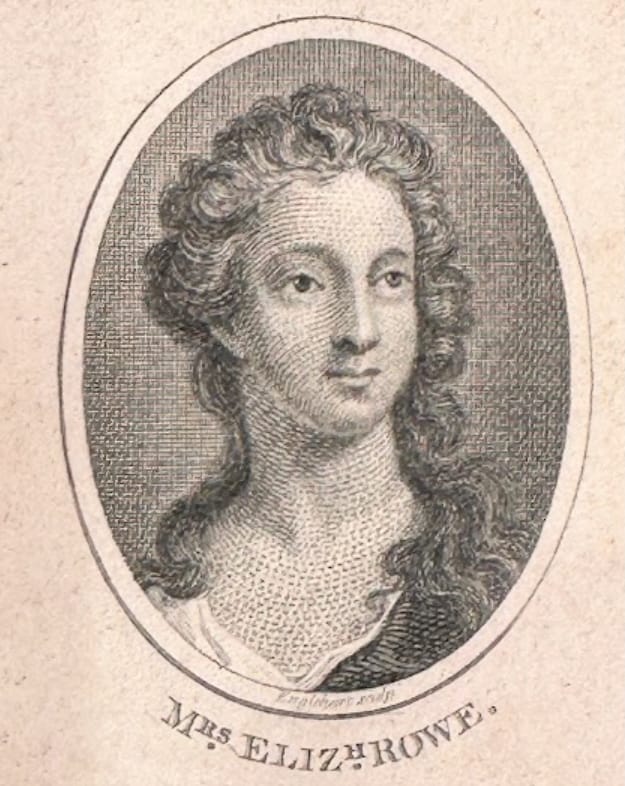- Vital Sparks
- Posts
- Before the rosy dawn of day
Before the rosy dawn of day
Elizabeth (Singer) Rowe
In my studies of Isaac Watts, I came across the poet Elizabeth Rowe, née Singer. The story that Watts proposed to her, but was turned down. She did marry Thomas Rowe when she was 36 and he was 23; but Thomas dies of “consumption” just five years into the marriage. In any case, Watts and Rowe were great admirers of each other’s poetry and Christian piety. In her will, she asked Watts to publish a book of meditations by her (“Devout Exercises of the Heart in Meditation and Soliloquy, Prayer, and Praise”).
She was one of those poets who were very popular in their day, but who is not read much currently, as tastes change. Exhibiting modesty and virtue and writing rhymed, largely religious, poetry under a classical pseudonym (in her case, “Philomela”) is certainly not the modern style. She wrote “Pindaric odes” and a 2000-line History of Joseph — again, not à la mode. She wrote many hymns in standard meter, and I think she was skillful in this genre, although I have not made a great study of them. One of her hymns, Before the rosy dawn of day appeared in many hymnbooks and tune books.
1. Before the rosy dawn of day,
To thee, my God, I’ll sing;
Awake, my soft and tuneful lyre!
Awake, each charming string!
2. Awake! and let thy flowing strain
Glide through the midnight air,
While high amidst her silent orb
The silver moon rolls clear.
3. While all the glitt’ring starry lamps
Are lighted in the sky,
And set their Maker’s greatness forth
To thy admiring eye:
4. While watchful angels round the just,
As nightly guardians wait,
In lofty strains of grateful praise
Thy spirit elevate.
5. Awake, my soft and tuneful lyre!
Awake each charming string!
Before the rosy dawn of day,
To thee, my God, I’ll sing.
6. Those round the heav’nly arch dost draw
A dark and sable veil,
And all the beauties of the world
From mortal eyes conceal.
7. Again, the sky with golden beams
Thy skilful hands adorn,
And paint, with cheerful splendor gay,
The fair ascending morn.
8. And as the gloomy night returns,
Or smiling day renews,
Thy constant goodness still my soul
With benefits pursues.
9. For this I’ll midnight vows to thee
With early incense bring;
And e’er the rosy dawn of day,
Thy lofty praises sing.
Not all of these verses are successful, perhaps, but some are quite charming. I like the repeat of “Before the rosy dawn of day” as the poem progresses, and the images of the stars being lighted under God’s watchful eye while angels are guarding us in our sleep.
The first two verses are the poetry for ENFIELD 184, with music by Samuel Chandler, first published (says Makers of The Sacred Harp) in the 1785 edition of Brownson’s Select Harmony. Unfortunately, I think, it is not sung often enough. Based on a search at Internet Archive, this poem was set to music in The Delaware Harmony by Azariah Fobes, and appears with ENFIELD in Smith and Little’s Easy Instructor, Stephen Jenks’s Harmony of Zion (1818), The 1819 Village Harmony, Lewis’s The Beauties of Harmony, The Missouri Harmony (1821), Wyeth’s Repository (1826), Die Union Choral Harmonie (with German translation) in 1833, and The Ancient Lyre (1848). It has appeared in every version of The Sacred Harp (in the Denson revision line) since the first edition in 1844.
I can’t find a good transcription of all her hymns, but I would recommend to rising composers that they look online at Internet Archive for her complete works.
